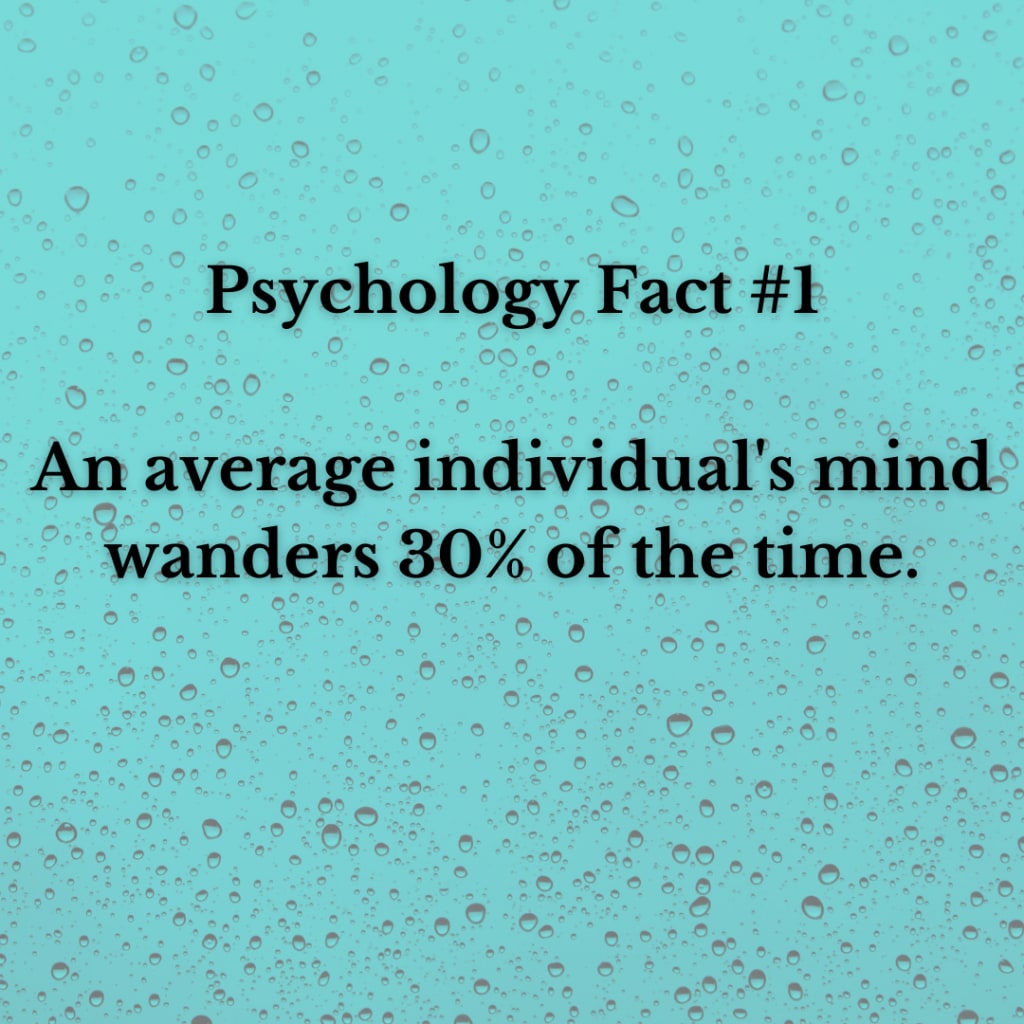Content warning
This story may contain sensitive material or discuss topics that some readers may find distressing. Reader discretion is advised. The views and opinions expressed in this story are those of the author and do not necessarily reflect the official policy or position of Vocal.
PSYCHOLOGY FACTS
15 PSYCHOLOGY FACTS THAT WILL BLOW YOUR MIND

Every day, researchers discover new things about human psychology, from mundane facts to
mind-blowing revelations that challenge everything we know about ourselves. For example, what are
the psychological secrets of attraction? What are the laws of psychological power? These questions
go straight to the heart of human experience. Some discoveries reveal unsavory or depressing
truths about human nature. For example, a 2020 study from the journal Frontiers in
Psychology explains why and how humans are programmed, under certain circumstances,
to take pleasure in others’ misfortune and pain, a phenomenon known as schadenfreude.
Not all psychological discoveries sour our perspective of human psychology;
many discoveries renew our faith in humanity and remind us how incredible people can be.
A recent study found that acts of kindness in a closed environment really do come back
around. If you’re kind to others, there’s a good chance they will return the favor.
Other profound discoveries explain the quirks and oddities that make us human,
finally giving meaning to ideas and experiences we have never understood before. Why do some people
love scary movies despite, at some level, fearing for their lives? Why does seeing someone yawn
cause you to yawn too? These questions and many others
have occupied our popular imagination for years, leading many experts to investigate precisely why
we do the things we do. However, their findings don’t always align with the general or widespread
consensus. In some cases, what they discover opens our eyes to mind-blowing patterns and phenomena
with profound implications for our daily lives. For example, a group of researchers recently found
that deep and consistent sleep might prevent neurodegenerative diseases like Alzheimer's.
In this video, we’re going to cover fifteen mind-blowing facts taken straight from the pages
of leading psychological research. If you’ve ever wondered why you do the things you do or where
your preferences come from, you’ll want to stick around because these surprising psychological
facts may finally give you the answers you never knew you needed. Like discoveries in any field,
it’s hard to say whether we know or understand the complete picture of our psychology,
but these discoveries make one thing clear: there are plenty of mind-blowing discoveries left to be
made. With these fifteen surprising psychological facts, we’re only scratching the surface.
1. Dark Attraction What personalities do
humans find most attractive? According to a study from Washington University, we are
surprisingly attracted to dark or evil personality traits. Despite their common association with
narcissism and psychopathy, for many people, there’s something irresistible about them.
Luckily, this correlation isn’t as self-destructive as it sounds. We’re
attracted to dark personalities not because they’re evil but because these people present
themselves with greater-than-average confidence and charisma. They’re attractive on the outside,
but once we dig below the surface, dark personalities begin to lose their charm.
2. The Know-It-All Do intelligent people know
how smart they are? Surprisingly, people of above-average intelligence are more likely to
underestimate their brainpower, rating themselves as less capable than average. Interestingly,
the opposite is true for people on the lower end of the spectrum. If you know
someone who thinks they know everything, there’s a very good chance they don’t.
3. The Magnet Paradox Attraction rarely functions the
way we expect. For example, if you like someone who likes you, your sudden interest may push them
away. This phenomenon is known as the Magnet Paradox. Usually, if person A likes person B,
you would expect their mutual interest to pull them together, but the opposite is often true.
Like the poles on a magnet, people are drawn to individuals who show less interest in them.
Come on too strong, and you’ll push people away. But if you pull back and create some distance,
they may come running back. 4. Mind-Reading Sarcasm
Let’s get one thing clear… no one can read minds, but some people get pretty close. If you’re one of
those people, there’s a surprisingly easy way to tell. Just think about your sense of humor. People
who like to be sarcastic or banter with others are usually gifted at reading peoples’ minds.
You may not realize it, but your ironic sense of humor makes you more perceptive than most.
5. Visions of Misery Before you fall asleep at night,
someone’s face sometimes pops into your mind. Maybe it’s your partner or your best
friend. Perhaps you envision your boss’s sour face or a coworker you just can’t stand. But
do these dreams and visions mean anything? The person you envision just before falling
asleep may play an important role in your life, though it’s not always a positive one. Whoever
comes to mind in your last waking moments is either a great source of joy… or a great
source of stress and misery. Depending on who you think of, it may be a little bit of both.
6. The Attractiveness Bias Do good-looking people really
have it easier than the rest of us? The simple answer is… yes. Conventionally attractive are
likely to be rated highly in other categories by their peers. For example, if you find someone
attractive, you’re more likely to give them your trust, whether or not they deserve it.
The opposite is true of people we find unattractive. If someone is conventionally
unattractive, many people assume they’re also untrustworthy and unintelligent. The
attractiveness bias isn’t always fair, but that’s just the way our brains work.
7. A Recipe for Happiness Do you know someone who is always rushing
from place to place? You might think, “wow, their life seems miserable.” The truth is that busy
people tend to live happier and more fulfilling lives. It’s not because they are wealthier or
more successful but because they spend less time worrying about what could go wrong.
People with too much time on their hands are susceptible to more anxiety and rumination,
often overthinking their goals and decisions. So, when you’re stressed,
find an activity to keep your mind busy. 8. The Terror of Thinking
How often do you spend time just thinking? A surprising amount of people are terrified of
being alone with their thoughts. According to a 2014 study, most people would rather
endure a small electric shock than spend fifteen minutes in quiet contemplation.
9. Unconscious Demotivation Do you explain your goals to everyone
you meet? Studies show that people who discuss their goals are less likely to achieve them.
Sharing your goals provides you with a small unconscious reward as if you’ve accomplished much
more than you have. Until you’ve met your goal, keep it to yourself. That way, when you reach the
finish line, you’ll have earned your reward. 10. Placebo Productivity
When you’re feeling lazy and unproductive, it’s easy to spiral into a negative state of mind.
When this happens, many people become unmotivated, usually hindered by feelings
of pessimism and hopelessness. What if there was an easy to turn things around?
It turns out that negative states of mind aren’t as all-consuming as they seem. Most people don’t
realize that our moods and mental states are surprisingly malleable. If you tell yourself you
are lazy, things will never get better. You’ll keep feeling lazy. But if you flip the script,
you can change your state of mind and build motivation in no time.
11. Sunlight Disorder
How much time do you spend outside each day? On average, experts recommend at least 20 minutes
of outside time daily. During those 20 minutes, your body needs sunlight containing vitamin D,
an essential vitamin that supports bone growth, reduces inflammation,
and bolsters your immune system. While vitamin D is good for your physical health, it also
plays an equally important role in your mental health, specifically your mood and state of mind.
Studies show that low sun exposure is a reliable predictor of unhappiness, laziness, and even mood
disorders like depression. Generally, the less time you spend outside each day, the more likely
you are to feel sad and low. So, get outside; even a few minutes a day can make all the difference.
12. Lopsided Contradictions Most people are incapable of
fairly judging their own mistakes, but we’re even worse at judging the mistakes of others.
A recent survey shows that people are willing to condemn other people’s failures even if
they made the same mistake moments earlier. The worst part is… many participants showed
little awareness of their hypocrisy. 13. Symptoms of a Healthy Mind
Are you a sarcastic person? There are surprising benefits to being sarcastic.
Most people don’t realize that sarcasm demands significant intelligence and nuance. To make
or even understand a sarcastic comment can be an exercise in creative thinking. Yes,
sarcasm can be cruel and hurtful, but it’s also a sign that your mind is sharp and healthy.
14. Pattern Recognition Humans automatically look for patterns in the
world around them. For example, when you see two things grouped together, you see them as a pair.
If you encounter three things evenly spaced, you might imagine a triangle between them. The human
brain is programmed to interpret the world in patterns — a fact you can use to your advantage.
If you want people to pay attention to something, use patterns to direct their attention from one
point to another. By leaving space between objects or grouping them in clusters,
people will understand you more clearly and perceive you as a more persuasive individual.
15. The Truth about Multitasking
Are you an efficient multitasker? Upwards 70% of people think they’re good at juggling unrelated
tasks, but most people’s brains don’t work that way. Surveys show that a measly 2.5% of
people can multitask effectively. For the rest of us, doing two or
more things at once isn’t improving our productivity. In fact, for most people,
multitasking significantly decreases their performance. Unless you’re part of that 2.5%,
About the Creator
Dessie The Writer
Call me Dessy the Writer …writing is a new hobby of mine which I just discovered I was born and raised in Ghana, I lived a childhood made of no toys but joys read my story and let me know what you think about my story
Enjoyed the story? Support the Creator.
Subscribe for free to receive all their stories in your feed. You could also pledge your support or give them a one-off tip, letting them know you appreciate their work.






Comments (1)
NICE READ